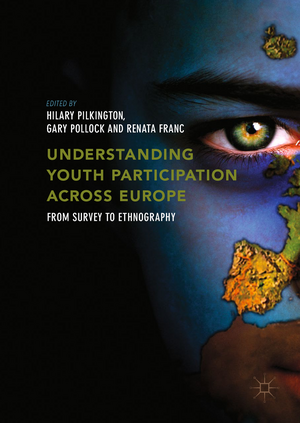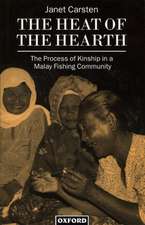Understanding Youth Participation Across Europe: From Survey to Ethnography
Editat de Hilary Pilkington, Gary Pollock, Renata Francen Limba Engleză Hardback – 18 oct 2017
These contributions make the book’s case that transnational and multi-method projects can enrich our understanding of how young people envisage their place and role in Europe’s political and civic space. The book challenges methodological assumptions that survey research shows the big picture but at the cost of local nuance or that qualitative research cannot speak beyond the individual case, and demonstrates the added explanatory value of triangulating different kinds of data.
Understanding Youth Participation Across Europe will be of interest to students and scholars across a range of disciplines, including Sociology, Political Sociology, Youth Studies and Political and Civic Participation.
Preț: 590.49 lei
Preț vechi: 694.69 lei
-15% Nou
Puncte Express: 886
Preț estimativ în valută:
113.01€ • 117.54$ • 93.29£
113.01€ • 117.54$ • 93.29£
Carte tipărită la comandă
Livrare economică 15-29 aprilie
Preluare comenzi: 021 569.72.76
Specificații
ISBN-13: 9781137590060
ISBN-10: 1137590068
Pagini: 340
Ilustrații: XXXVI, 340 p. 17 illus.
Dimensiuni: 148 x 210 x 27 mm
Greutate: 0.6 kg
Ediția:1st ed. 2018
Editura: Palgrave Macmillan UK
Colecția Palgrave Macmillan
Locul publicării:London, United Kingdom
ISBN-10: 1137590068
Pagini: 340
Ilustrații: XXXVI, 340 p. 17 illus.
Dimensiuni: 148 x 210 x 27 mm
Greutate: 0.6 kg
Ediția:1st ed. 2018
Editura: Palgrave Macmillan UK
Colecția Palgrave Macmillan
Locul publicării:London, United Kingdom
Cuprins
Introduction: Thinking globally, understanding locally; Gary Pollock, Hilary Pilkington and Renata Franc.- Part 1: Beyond comparison? Context-sensitive survey research.- 1. Survey research and sensitivity to context: The MYPLACE project and its case study approach; Gary Pollock.- 2. Beyond 'left' and 'right'? The role of culture and context in young people's understanding of ideology; Inta Mieriņa.- 3. Attitudes towards the EU among young people in eastern Germany, Greece, and the UK: embedding survey data within socio-historical context; Robert Grimm, Gary Pollock, Mark Ellison, Alexandra Koronaiou, Evangelos Lagos and Alexandros Sakellariou.- Part 2: Beyond comparison? Transnational qualitative research.- 4. Can qualitative data speak beyond the individual case? Employing meta-ethnography for the synthesis of findings in transnational research; Hilary Pilkington.- 5. ‘One big family’: Emotion, affect and solidarity in young people’s activism in radical right and patriotic movements; Hilary Pilkington, Elena Omel’chenko and Benjamin Perasović.- 6. Believing in participation: Youth, religion and civic engagement; Alexandros Sakellerion.- 7. Young people's attitudes to, and practices of, political participation on the Internet: what can we learn from large-scale qualitative research?; Florian Sipos.- Part 3: Triangulation in practice.- 8. Introduction to triangulating data; Renata Franc.- 9. Youth, history and a crisis of democracy? Perspectives from Croatia; Renata Franc, Benjamin Perasović and Marko Mustapić.- 10. Does history matter for young people`s political identity? The role of past authoritarianism in Germany and Spain; Britta Busse, Mariona Ferrer-Fons, Robert Grimm, Jochen Tholen, Sanjin Uležić and Kevin Wolnik.- 11. History in danger and youth civic engagement: Perceptions and Practice in Telavi, Georgia; Tamar Khoshtaria, Mariam Kobaladze and Tinatin Zurabishvili.- 12. Conclusion: What is the ‘value added’ of multi-method, transnational research?; Hilary Pilkington, Renata Franc and Gary Pollock.
Notă biografică
Hilary Pilkington is Professor of Sociology at the University of Manchester, UK.
Gary Pollock is Professor and Head of Sociology at Manchester Metropolitan University, UK.
Renata Franc is Senior Research Fellow and Professor at Institute Ivo Pilar, Croatia.
Gary Pollock is Professor and Head of Sociology at Manchester Metropolitan University, UK.
Renata Franc is Senior Research Fellow and Professor at Institute Ivo Pilar, Croatia.
Textul de pe ultima copertă
This edited volume presents findings from a major cross-European research project mapping the civic and political engagement of young Europeans in the context of both shared and diverse political heritages. Drawing on new survey, interview and ethnographic data, the authors discuss substantive issues relating to young people’s attitudes and activism including: attitudes to the European Union and to history; understanding of political ideologies; how attitudes to democracy are shaped by political heritage; activism in radical right wing groups and religion-based organisations; and digital activism.
These contributions make the book’s case that transnational and multi-method projects can enrich our understanding of how young people envisage their place and role in Europe’s political and civic space. The book challenges methodological assumptions that survey research shows the big picture but at the cost of local nuance or that qualitative research cannot speak beyond the individual case, and demonstrates the added explanatory value of triangulating different kinds of data.
Understanding Youth Participation Across Europe will be of interest to students and scholars across a range of disciplines, including Sociology, Political Sociology, Youth Studies and Political and Civic Participation.
These contributions make the book’s case that transnational and multi-method projects can enrich our understanding of how young people envisage their place and role in Europe’s political and civic space. The book challenges methodological assumptions that survey research shows the big picture but at the cost of local nuance or that qualitative research cannot speak beyond the individual case, and demonstrates the added explanatory value of triangulating different kinds of data.
Understanding Youth Participation Across Europe will be of interest to students and scholars across a range of disciplines, including Sociology, Political Sociology, Youth Studies and Political and Civic Participation.
Caracteristici
Draws on a high profile, large scale European research project which covered over 14 countries Offers a unique methodological approach Challenges the methodological assumption that survey research shows the big picture but at the cost of local nuance Includes supplementary material: sn.pub/extras
















